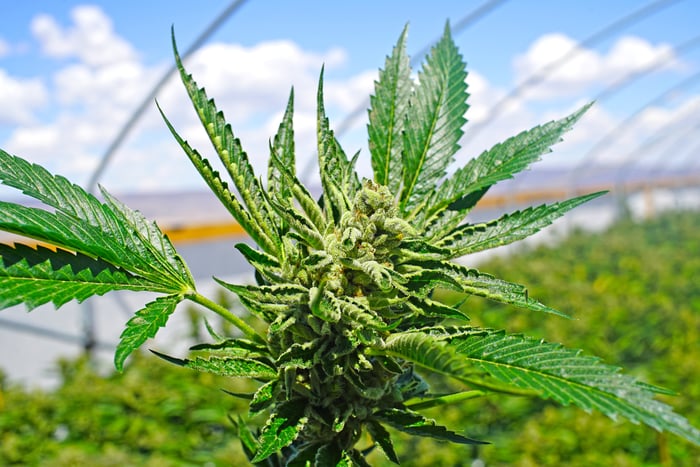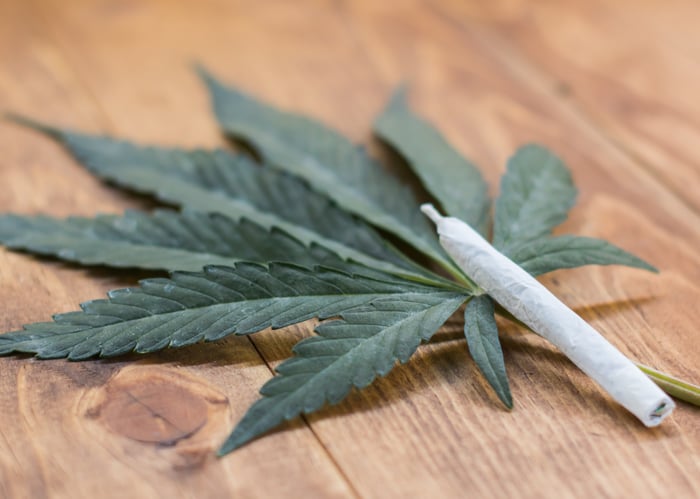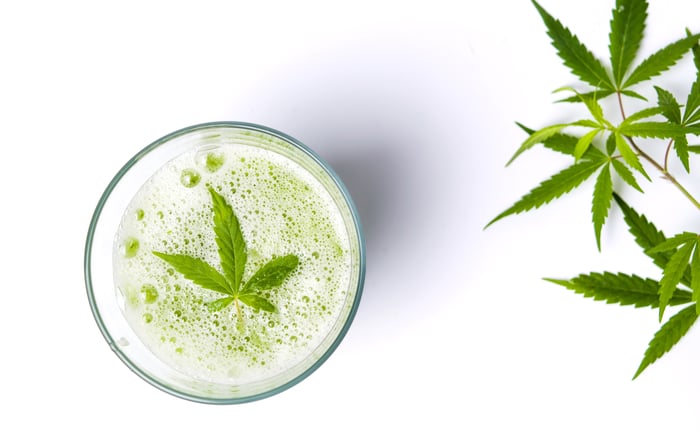The marijuana industry broke through barriers in 2018 that had previously seemed impossible just a decade earlier.
Following years of promises from Canadian Prime Minister Justin Trudeau, and months of debate in the Senate, Canada became the first industrialized country in the world, and only the second overall behind Uruguay, to legalize recreational marijuana. Rolling out the red carpet for cannabis should lead to billions of dollars in added annual sales, but more importantly legitimizes marijuana as a business model that's here to stay.

Image source: Getty Images.
Investors expect to make money from the cannabis industry both directly and indirectly. Marijuana growers come in direct contact with the plant and should be the prime beneficiaries of the industry's growth. According to investment firm Cowen & Co., global cannabis sales could hit $75 billion by 2030. For context (although it's a completely different analysis), a co-authored report from Arcview Market Research and BDS Analytics is calling for $16.9 billion in global weed sales in 2019.
Ancillary businesses offer plenty of potential, too. Think about the marketing and advertising, financing, packaging, and value-added solutions that are going on behind the scenes to support the industry and make cannabis sales possible.
Fear builds that a flowering pot industry will siphon sales from the alcohol industry
But not all industries are necessarily happy to see the cannabis industry budding before our eyes. One good example is the alcohol industry, where pundits have opined that beer, spirit, and wine producers could lose sales to the marijuana industry.
In the 2017 "Monitoring the Future" survey, nearly 44,000 students in the eighth, 10th, and 12th grades from 360 public and private schools were interviewed about numerous topics, including their perception toward cannabis, alcohol, and tobacco. What the survey found was that far fewer students today believe their parents would disapprove of cannabis use compared to the "Monitoring the Future" survey conducted four decades prior. This improved perception of marijuana was visible when students were asked about rare, occasional, and regular use of pot.

Image source: Getty Images.
Comparatively, the percentage of 12th-grade students who believed that their parents would disapprove of their choice to binge drink or smoke a pack of cigarettes a day actually rose in 2017 from the survey four decades prior.
Now, I know what you might be thinking: "These are students. Why do their opinions matter?" The answer is that the younger generation will dictate the future of cannabis and alcohol sales. Favorability toward weed tends to decline with age, meaning the younger generation (i.e., millennials and generation Z) has a much more favorable view of cannabis than aged Americans. These younger generations will be consumers for a long time, meaning their opinions will be pivotal in shaping these vice industries going forward.
This leading alcohol industry CEO suggests much ado about nothing
But is this the case? Will cannabis steal sales away from the alcohol industry? In the early going, the answer would appear to be "no."
This past Wednesday, Anheuser-Busch InBev (BUD 0.13%) CEO Carlos Brito was interviewed in Davos, Switzerland, by CNBC's Squawk Box and noted that the company doesn't have any data suggesting that cannabis sales are hurting its beer sales in North America. Said Brito, "We still don't have enough data points because there's noise to prove that beer -- alcoholic beverages -- suffers."

Image source: Getty Images.
One reason Brito may not have this data yet is that cannabis industry legalizations are still very new. Canada's recreational launch came just three months ago, and a backlog of cultivation license and sales permit applications at Health Canada has constrained supply. In other words, it doesn't provide a big enough data sample yet.
Another reason Anheuser-Busch InBev can't accurately determine if legal cannabis is a problem for its beer sales in the U.S. is tourism. CNBC notes that 15% of the 82 million people who visited Colorado in 2016 "participated in marijuana-related activities," which makes it tough to tell whether there's a genuine shift away from alcohol and toward cannabis or if these nonresidents are skewing the results.
Alcohol producers like Anheuser-Busch InBev hedge their bets
However, what is clear is that the alcohol industry wants to hedge its downside in case cannabis does become a problem.
In December, Anheuser-Busch InBev announced a $100 million joint venture with Canadian grower Tilray (TLRY) to research and develop cannabidiol (CBD)- and/or tetrahydrocannabinol (THC)-based beverages. CBD is the nonpsychoactive cannabinoid best known for its perceived medical benefits, whereas THC is the cannabinoid that gets a user high. Alternative consumption options like cannabis-infused beverages should be legal by no later than the coming October in Canada, providing Tilray and Anheuser-Busch plenty of lead time to develop, brand, and launch infused products. Tilray and Anheuser-Busch will be contributing $50 million each toward the joint venture.

Image source: Getty Images.
This partnership was particularly interesting given that Brito had little interest in a cannabis joint venture as recently as June 2018. Here's what Brito had to say when interviewed by Just-Drinks.com in June:
Cannabis is something that we as a company are trying to learn more about. It's going to be regulated. It's going to be commercialized. But it's still a very restricted business and, in most places, it's not legal... We'll continue to follow it, but for now, we don't feel we need to do anything.
Aside from the Anheuser-Busch InBev-Tilray tie-up, Corona and Modelo beer producer Constellation Brands (STZ -0.04%) is also expected to develop infused products with Canopy Growth (CGC -0.66%), the largest marijuana stock by market cap in the world. In November, Constellation Brands completed a record $4 billion equity investment in Canopy Growth. This equity stake, totaling 37%, signals that Constellation believes in far more than just infused beverages. But given Constellation's deep pockets and marketing prowess, as well as Canopy Growth superior branding in the cannabis industry, the development of branded cannabis beverages only seems logical.
The truth is it's still too early to tell if alcohol sales will suffer from the rise of marijuana, but alcohol producers probably aren't going to take too many chances. Thus, look for partnership announcements to continue in 2019.
Check out the latest Anheuser-Busch InBev earnings call transcript.





